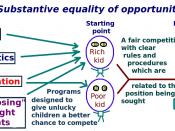Within many cultures and societies around the world, there are various cultural universal which express issues of necessity or importance for these groups. These may include a form of religion, a system of values, and a form of education. Our society in North America is no exception, and education is viewed as very important as a cultural facet. Since we value success in the future of both our nation and as individuals, a solid education system has been designed for children age five through eighteen. This system is a large state responsibility with many attached issues.
Some of these issues include the involvement of the private and public sectors which has caused some controversy in regard to politics and economics. There are those who view it as a means by which to continue to progress as humans through the passing of knowledge; and there are those who treat education as a means by which to create tangible wealth for ourselves and our nation at large.
Both of these arguments consider education an asset, however, one approaches education from a market perspective, and the other from a non-market viewpoint. Each of these approaches has experienced failure in one-way or another. On the one hand, the market approach has failed to recognize education as a long-term investment in a nation's future that is capable of maintaining a civilization in a time of need, and in that regard has been narrow-sited and too microscopic.
While on the other hand, the non-market approach has failed to recognize the importance of a market approach in securing the financial and physical aspect which helps the material progress needed to develop and use current sources of knowledge.
Furthermore, there are the questions of what to produce? How to produce it? And, for whom to produce these educational services? The optimal goal in answering these questions is that these educational services ought to consider all the needs and requirements of a society's short and long-term aspirations equally. It should consider the wealthy as well as the less fortunate, and therefore, be able to provide a level playing field not only in terms of equal opportunity for all, but in terms of equitable access to resources for all segments of that society.





